Bench around the tree do it yourself
It is pleasant to have a rest on a warm summer evening sitting on a bench, admiring the beauty of a blooming well-kept garden. Of course, the easiest way, without bothering, to buy a shop. But it is much more pleasant to relax on the bench, made with his own hands. You will have to spend two - three evenings on its construction, but you will enjoy the work of your hands for years. This will be your favorite place at any time of the day, as even in the afternoon heat one of its parts will remain in the shade. And the branches of a spreading tree will give a pleasant feeling of security and comfort.
In this article we will explain how to make a bench around the tree with your own hands, give drawings, photos and video instructions.
There are many variations and styles of benches: from deliberately coarse to skillfully made, with a bunch of small details; from the most ordinary to highly non-standard and original. For the construction of the shop using different materials: wood, plastic, wrought iron, stone, marble and even glass. Also the combined benches look great. The most common material for the construction of the bench is, of course, wood. It is one of the warmest and easiest to process materials. Also, wooden furniture looks very aesthetic. And the eye pleases, and it's nice to sit down.
Choosing the right tree in the garden

Determining the location of a round bench, we do not recommend placing it around a young tree, as this may look a little ridiculous, especially as the tree grows quickly and over time the shop will crowd it.
The thicker the tree, the prettier will look like a round bench around it. It is also not advisable to dwell on a fruit tree, since in summer or autumn it will be necessary to clear the bench from fallen fruits quite often.
So nice to lean into the bark of an old tree, enjoying the rustling of leaves. Here you can sit alone, reading your favorite book, or spend unforgettable fun hours in the company of best friends.
We select and process wood
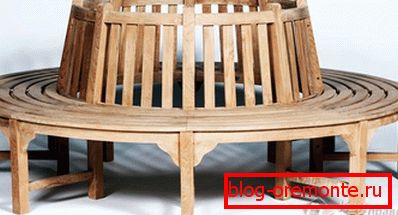
Since the bench that you are going to make, will be located under the open sky, it will be exposed to the biological effects of the environment. Therefore, you should choose the right tree species. Ideal: oak, larch, pine, teak and other materials resistant to biological and mechanical stress. In extreme cases, you can take any wood species remaining after making something. But if it is not very resistant to moisture and fungi, you should carefully treat it with special impregnations.
All the details of the future bench should be sanded and treated with some antiseptic solution, wood impregnation or special oil. Especially it is necessary to pay attention to the front sides of the boards (cross section), since they absorb moisture the most. This is especially true of the lower part of the legs of the bench. They will come into contact with the soil, which will have a destructive effect on the wood. You can even put some litter. After processing, the material should dry for at least 12–18 hours (depending on the type of impregnation and the type of wood).
Preparatory work
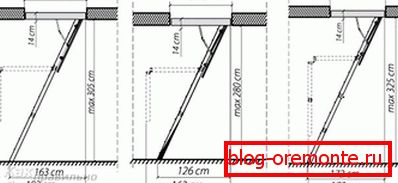
In order for the bench to stand evenly, it is necessary to level the area around the tree. Remove the excess land, and where you need to - get some sleep. Try not to damage the roots of the tree. For the same reason, it is not recommended to concrete the legs of the future bench by digging holes in the ground. If possible and desired, the site where the bench will be located can be poured with fine gravel or gravel.
So let's get to the fun part. This article provides several options for ring benches. But for a start, let us consider how to make the simplest bench to make around a tree - a quadrangular.
Square shop

In the process of preparation, it is important to pay special attention to the selection of the necessary building material and tools. You will need:
Instruments:
- screwdriver (or drill);
- jigsaw, circular saw or regular handsaw;
- sanding machine or sandpaper.
Materials:
- wood treatment impregnations;
- 16 boards 10 × 5 cm: about 8 m (for support posts);
- 16 boards 10? 2.5 cm: about 23 m;
- bolts or screws;
- paint or varnish for finishing the bench (optional).
There are standard dimensions for the bench:
- Seat height - 40–45 cm (with the legs will be comfortable to rest in the ground);
- Seat surface width: 45–50 cm.
The shop should not damage the trunk of the tree, so it is advisable, when constructing it, to leave a small indent from the crown (10–15 cm). In order to make the product even, first of all it is necessary to designate 4 internal points of support and 4 external points around the tree on the ground.
We make support stands, which will be four. Each of them will need 4 boards, 10 cm wide, 60 cm long, 50 cm long and 2 pieces of 40 cm each. They need to be bolted or self-tapping, as shown in the diagram. If you don’t like these base legs, you can use the benches of this article described in the third version - with a back. Install support posts at pre-marked points.
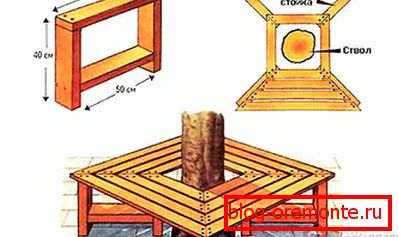
Then you will need 4 boards for each section of the bench. If the stem is about 50 cm in diameter (155–160 cm in circumference) and 15 cm away from the crown, one plank of the inner square will be 100 cm. Make an oblique cut at a 45 ° angle.
Carefully sawing all the boards of one section will be easier if you put them on a flat surface, setting the space between them with gaskets. Then, with the help of a ruler, outline the line of the slice, guided by the first, already finished, bar. After cutting along the intended line.
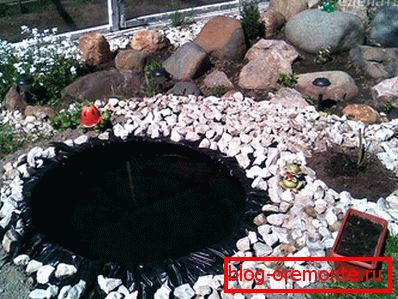

Fasten the short boards with bolts or screws to the supporting posts. Leaving a gap of 2 cm, attach the following strips, after cutting them at the same angle. They may slightly protrude from the support legs, thus covering the corners of the legs. The gap between the strips must leave! Otherwise, water will not be able to flow freely to the ground, due to which rot may appear at the joints. Thanks to the gaps, the bench will be easier to clean from sand and leaves. To even out the gaps between the boards, you can use linings (small plates of 2 cm thick, or something else).
The second bar should be 126.5 cm, the third - 153.5 cm. The longest bar is 180 cm. If the perimeter is the same, and the bars are five, then everything is just as simple: the first is 1 m, and each next one is 20 cm longer Only strips should be thinner - 8 cm. Or 9 cm with a centimeter gap.
The dimensions of the boards and the number of strips, if desired, can be changed proportionally. The design of the bench from this does not change much. But at the same time you need to calculate everything and monitor the accuracy of the cut, so that the product does not turn out to be curved and inconspicuous. After all, you have the goal to create beauty yourself!
The final stage in the construction of the bench is the finishing product. If necessary, grind the roughness created by the installation. Then the bench can optionally be painted or varnished.
Another solution
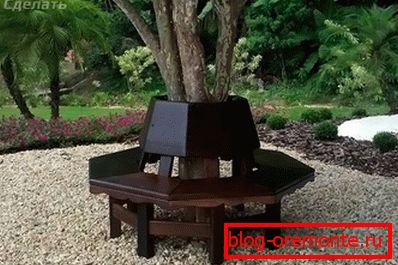
If you are not ready to spend too much time on the bench, and the previous version seems rather boring and primitive to you, you can simply modify its design.
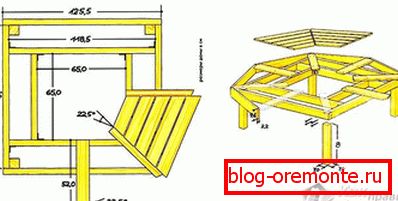
To do this, you just need to install in the middle of each section another support column. The distance from the tree trunk to the edges of the base legs should be the same. A slat should be cut at an angle not 45, and 22.5 °. So, you get eight sections. The length of the shortest bracket will be 30 cm. And the longest one is 67.5 cm (with a width of the seat 50 cm and a distance from the crown 15 cm).
Hex bench with backrest

After the preparatory work on the site where the bench will be located, it is useful to designate six points around the tree. To simplify the task, as well as to make the markup more accurate, you can make a contour of a star shape (two intersecting equilateral triangles) out of paper, as shown in the diagram. At each sharp corner of this figure there will be an outer edge of the base leg.
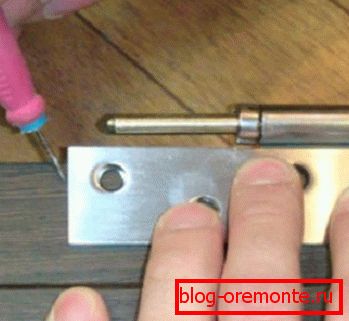
Schedule points of support on the ground. The predominant feature of this variant of the bench, though not the main one, is that the back is attached to it. It is very convenient and gives the product aesthetics.
For the construction you will need the same tools as for the first option. But you will need a little more materials:
- boards 6? 3 cm of different lengths: about 36–38 m (if you plan to make an apron, then another + 6 m);
- timber 5? 5 or 10? 5: 13–14 m;
- screws or bolts;
- paint or varnish.
We make the base legs for the bench. We take bars, 90 and 45 cm long, respectively, and 2 pieces of 40 cm each. We connect them with bolts or screws.

Cut the boards at an angle of 30 °. Leave gaps between the slats of 0.8 cm or more. The shortest strips should be 40 cm each (with a trunk thickness of no more than 50 cm), and the longest 100 cm. We calculate the length of the remaining strips depending on their number. Attach them to the uprights.
We make a back by attaching the desired number of slats to it. It will be more convenient to sit down if you install the backrest under a slight slope of 15-40 °. Then the horizontal bars of the legs should be cut at the same angle, and the lower plank of the back will be slightly longer than the top and should also be cut at a slight angle (depending on the back slope). Or you can attach them vertically. It all depends on your skill and imagination.
If you want to attach an apron, it will be easy. Six boards of the same length as the last bench of the bench should be cut from the front side at an angle of 30 °. Attach them to the legs of the base. Finishing work with finishing.

Having understood these schemes and having understood the main nuances, you will be able to improvise every possible way, to make your own invented variation of the bench around the tree.
Maybe you will be interested to read additional articles on the topic:
- How to make garden furniture?
- How to make a bench to give?
- How to make a live gazebo with your own hands?
Video
If the standard ideas of benches around the tree are not to your liking, then we bring to your attention creative solutions:
A photo
The photographs provide several original ideas for making a bench around a tree:
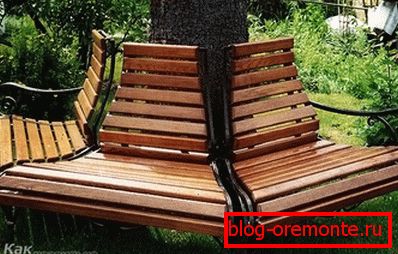
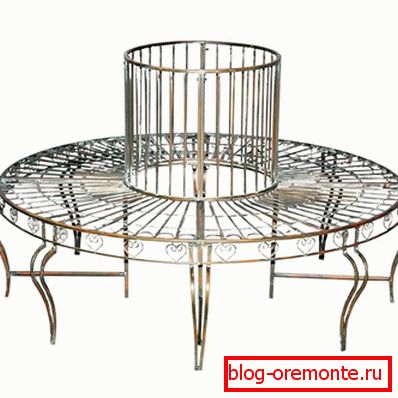
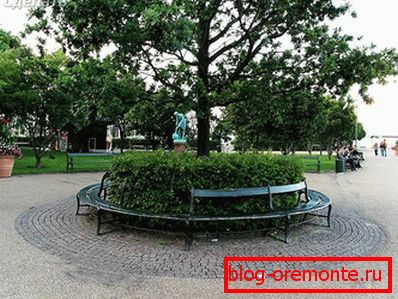
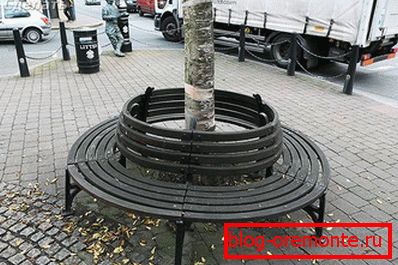
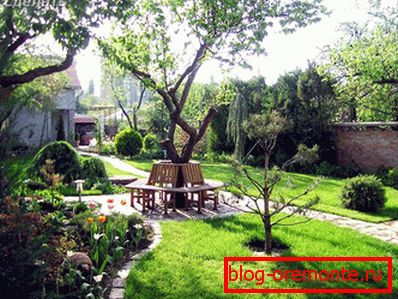
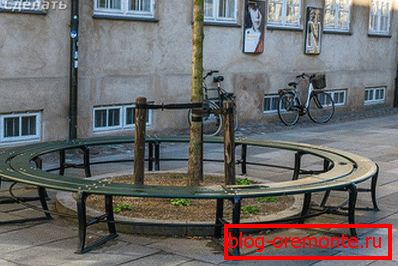
Scheme
If you want to make a bench around a tree, then below is a diagram that will help you with this:

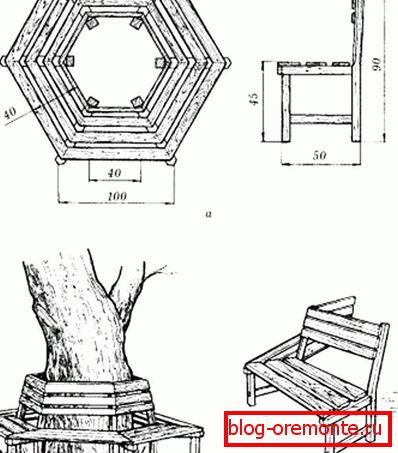


Scheme